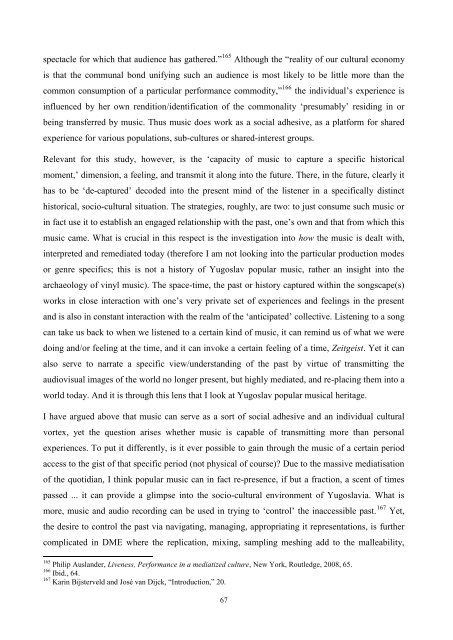UNIVERSITY OF NOVA GORICA GRADUATE SCHOOL ...
UNIVERSITY OF NOVA GORICA GRADUATE SCHOOL ...
UNIVERSITY OF NOVA GORICA GRADUATE SCHOOL ...
Create successful ePaper yourself
Turn your PDF publications into a flip-book with our unique Google optimized e-Paper software.
spectacle for which that audience has gathered.‖ 165 Although the ―reality of our cultural economy<br />
is that the communal bond unifying such an audience is most likely to be little more than the<br />
common consumption of a particular performance commodity,‖ 166 the individual‘s experience is<br />
influenced by her own rendition/identification of the commonality ‗presumably‘ residing in or<br />
being transferred by music. Thus music does work as a social adhesive, as a platform for shared<br />
experience for various populations, sub-cultures or shared-interest groups.<br />
Relevant for this study, however, is the ‗capacity of music to capture a specific historical<br />
moment,‘ dimension, a feeling, and transmit it along into the future. There, in the future, clearly it<br />
has to be ‗de-captured‘ decoded into the present mind of the listener in a specifically distinct<br />
historical, socio-cultural situation. The strategies, roughly, are two: to just consume such music or<br />
in fact use it to establish an engaged relationship with the past, one‘s own and that from which this<br />
music came. What is crucial in this respect is the investigation into how the music is dealt with,<br />
interpreted and remediated today (therefore I am not looking into the particular production modes<br />
or genre specifics; this is not a history of Yugoslav popular music, rather an insight into the<br />
archaeology of vinyl music). The space-time, the past or history captured within the songscape(s)<br />
works in close interaction with one‘s very private set of experiences and feelings in the present<br />
and is also in constant interaction with the realm of the ‗anticipated‘ collective. Listening to a song<br />
can take us back to when we listened to a certain kind of music, it can remind us of what we were<br />
doing and/or feeling at the time, and it can invoke a certain feeling of a time, Zeitgeist. Yet it can<br />
also serve to narrate a specific view/understanding of the past by virtue of transmitting the<br />
audiovisual images of the world no longer present, but highly mediated, and re-placing them into a<br />
world today. And it is through this lens that I look at Yugoslav popular musical heritage.<br />
I have argued above that music can serve as a sort of social adhesive and an individual cultural<br />
vortex, yet the question arises whether music is capable of transmitting more than personal<br />
experiences. To put it differently, is it ever possible to gain through the music of a certain period<br />
access to the gist of that specific period (not physical of course)? Due to the massive mediatisation<br />
of the quotidian, I think popular music can in fact re-presence, if but a fraction, a scent of times<br />
passed ... it can provide a glimpse into the socio-cultural environment of Yugoslavia. What is<br />
more, music and audio recording can be used in trying to ‗control‘ the inaccessible past. 167 Yet,<br />
the desire to control the past via navigating, managing, appropriating it representations, is further<br />
complicated in DME where the replication, mixing, sampling meshing add to the malleability,<br />
165 Philip Auslander, Liveness, Performance in a mediatized culture, New York, Routledge, 2008, 65.<br />
166 Ibid., 64.<br />
167 Karin Bijsterveld and José van Dijck, ―Introduction,‖ 20.<br />
67

















